Artificial intelligence (AI) is the defining technology of our era, rapidly reshaping industries and job roles. Despite this, public interaction with AI is still new. Consider this: tools like ChatGPT, which brought generative AI into the mainstream, only launched to the public in late 2022. This makes the widespread public use of AI a mere toddler, just three years old, while the internet, by comparison, has been evolving for over three decades since its public debut in 1993.
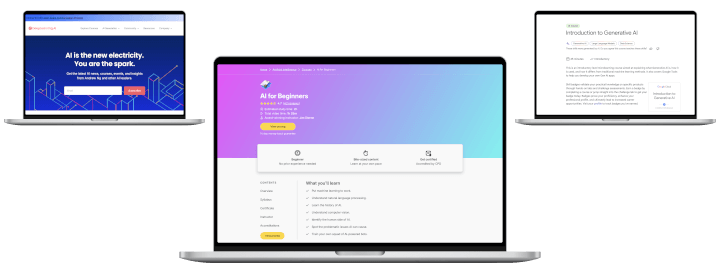
5 business AI training course approaches
Understanding where to start with AI training can be daunting. The following courses represent different approaches, catering to various needs and levels of technical expertise within different types of businesses:
1. GoSkills AI courses for beginners
Approach: Beginner-level, foundational. This course stack is designed to provide a practical bedrock of AI understanding specifically for typical office workers.
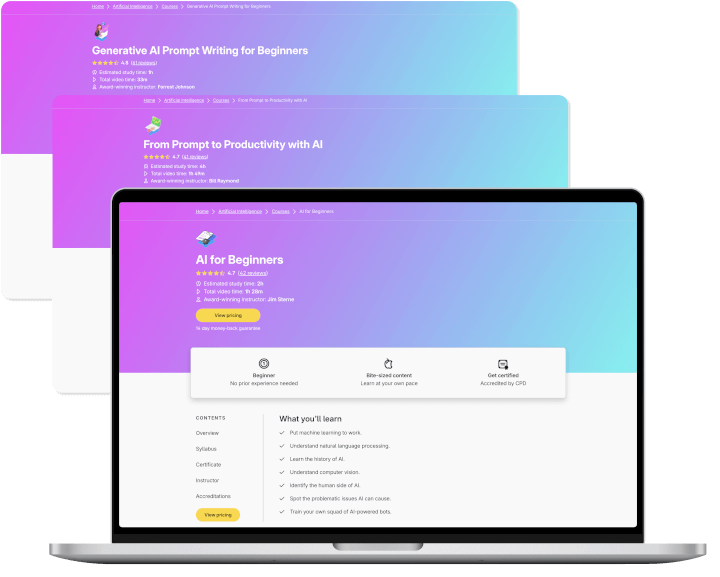
- AI for Beginners (2 hours): Grasp fundamental AI concepts like Natural Language Processing (NLP) and Machine Learning (ML) to understand the "why" and "how" of AI tools.
- From Prompt to Productivity with AI (4 hours): Master writing effective AI prompts for practical business tasks, including writing, planning, research, and data analysis.
- Generative AI Prompt Writing for Beginners (1 hour): Refine prompt engineering skills, focusing on prompt mechanics and templates for consistent and predictable AI outputs.
- Transform Your Communication with Generative AI (2 hours): Learn to apply AI to enhance written, verbal, and organizational communication, while also considering ethical implications.
GoSkills AI courses take between 1-4 hours to complete (and earn a certification). All are presented in a microlearning format, meaning bite-sized video lessons (typically 3-6 minutes) plus short quizzes and challenges.
Completing the whole bundle positions staff to drastically improve their productivity, as outlined in this article on the objective benefits of AI employee training.
- Best suited for: Small businesses looking to introduce AI fundamentals to their entire staff, particularly those with little to no prior technical background.
- Link: GoSkills AI course catalog
Go from AI zero to hero
Explore beginner-friendly artificial intelligence courses from GoSkills
Try for free2. DeepLearning.AI: AI for Everyone (via Coursera)
Approach: Beginner-level, broad, and non-technical. This course is specifically tailored for individuals without a technical background.
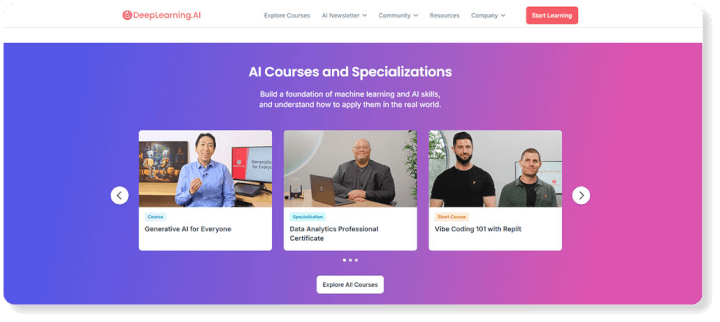
It covers key concepts like machine learning, deep learning, and neural networks without requiring coding. The course is self-paced, structured into four modules, and can typically be completed in 1-4 weeks (with approximately 6 hours of total video content).
- Best suited for: Non-technical professionals, business leaders, and anyone seeking a general yet insightful understanding of AI's capabilities and strategic implications across various industries.
- Link: AI for Everyone course
3. Elements of AI (University of Helsinki)
Approach: Beginner-level, foundational, with no prerequisites. This free online course aims to demystify AI for the broadest possible audience.
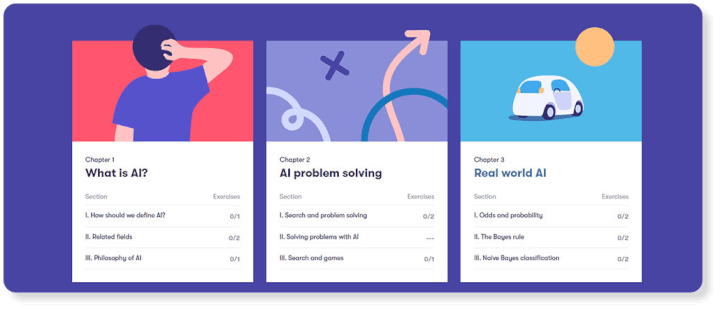
- Best suited for: Individuals or organizations seeking a robust, academic-level foundational understanding of core AI concepts, particularly useful for general public education or as a broad introduction before more specialized training.
- Link: Elements of AI courses
4. LinkedIn Learning: Applying Generative AI as a Business Professional
Approach: Beginner-level, focused on immediate practical application. This learning path is designed for business professionals looking to leverage Generative AI tools directly in their work.
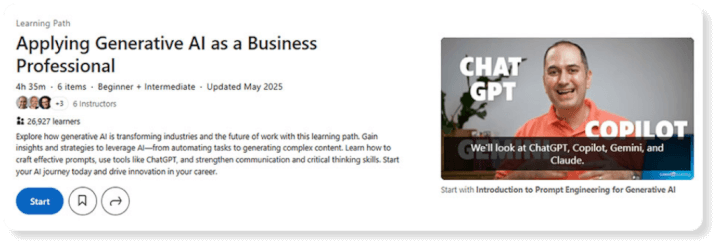
- Best suited for: Professionals and teams who need to quickly apply Generative AI tools to enhance their daily productivity, content creation, and strategic tasks in a professional context.
- Link: Applying Generative AI as a Business Professional course
5. Google Introduction to Generative AI Learning Path
Approach: Beginner-level, with an emphasis on Google's specific Generative AI tools and concepts. While accessible, it offers a slight lean towards the practical application of Google's AI technologies.
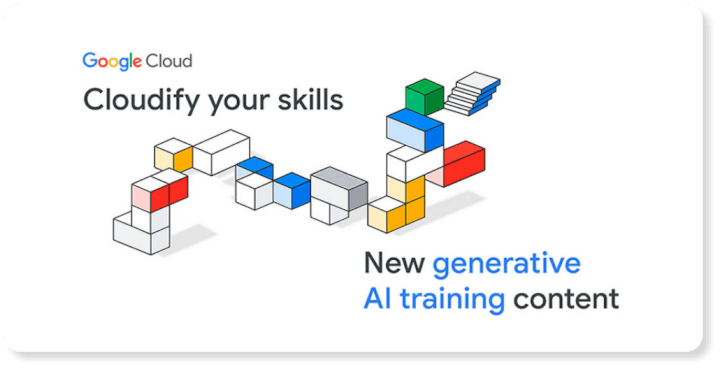
This learning path introduces foundational models, responsible AI practices, prompt engineering, and specific Google Generative AI tools like Vertex AI. It covers core concepts in a clear, accessible manner with a mix of videos, readings, and hands-on labs. The path consists of multiple courses and can be completed relatively quickly, often within a few hours to a day, allowing for rapid understanding of key concepts.
- Best suited for: Businesses and individuals interested in understanding and utilizing Google's Generative AI tools and concepts, or those looking for free, high-quality, practical training directly from a leading AI developer.
- Link: Google Introduction to Generative AI Learning Path
Weighing AI training investments with technological timelines
As the table below illustrates, the internet had a nearly two-decade run from its public launch until the full blossoming of user-generated content and mobile-first experiences. In stark contrast, public-facing AI has gone from niche research to global phenomenon in a matter of just a few years.
| Year | Major Internet Milestones | Major AI Milestones |
|---|---|---|
| 1993 | World Wide Web software put in public domain, early graphical browsers (Mosaic) emerge, making the web accessible. | |
| 1994 | First commercial banner ads appear; JavaScript is introduced, enabling dynamic web pages. | |
| 2003-2006 | MySpace (2003), Facebook (2004), YouTube (2005), and Twitter (2006) launch, igniting the user-generated content and social media revolution. | |
| 2007 | The iPhone launch revolutionizes mobile internet access. | |
| 2014-2017 | Breakthroughs in deep learning with Generative Adversarial Networks (GANs, 2014) and the Transformer architecture (2017) lay foundations for modern generative AI. | |
| 2019-2021 | OpenAI releases GPT-2 (2019) and GPT-3 (2020), showcasing highly coherent text generation. DALL-E (2021) brings text-to-image AI to broader attention. | |
| 2022 | ChatGPT is launched to the public, rapidly reaching millions of users and catalyzing mainstream awareness of generative AI. | |
| 2023-2025 | Rapid proliferation of generative AI models (GPT-4, Claude, Gemini), integration into productivity tools, emergence of specialized AI applications. |
Key takeaway: When considering AI upskilling, put the current public AI stage into perspective. The internet, now a ubiquitous part of our daily lives, had a relatively gradual ramp-up from its public debut.
In contrast, AI, particularly has exploded into public consciousness, but only since ChatGPT's release in 2022. This presents businesses with a unique challenge: embracing AI's transformative potential without overcommitting to technologies that are still rapidly evolving.
AI adoption in businesses: the 2023-2025 landscape
The rapid public emergence of AI is mirrored by its accelerating adoption in the business world, with recent surveys highlighting significant shifts:
- Overall AI adoption on the rise: According to McKinsey's Global Survey on AI (2024), overall AI adoption by organizations jumped to 72%, a significant increase from hovering around 50% for the past six years. This suggests a broad move beyond just experimentation.
- Generative AI leading the charge: The McKinsey survey also found that 65% of respondents reported their organizations are regularly using generative AI, nearly double the percentage from their survey just ten months prior. The average organization using gen AI is doing so in two functions, most often marketing and sales, and product and service development.
- Impact on efficiency and productivity: PwC's 28th CEO Survey found that more than 50% of CEOs report that Generative AI has already led to improved efficiency, and 49% expect it to enhance profitability in the next 12 months.
This data underscores that AI adoption is not just a trend but a strategic imperative, with businesses rapidly moving from exploration to active deployment and seeing tangible benefits.
Why foundational AI training is key to business future-proofing
Given AI's explosive growth and its immediate impact on business operations, investing in foundational AI training is no longer an option but a strategic imperative. As the adoption statistics show, businesses are rapidly integrating AI. Those that equip their workforce with even basic AI literacy will gain a significant competitive edge.
For business organizations, foundational AI training offers several critical advantages:
- Boosted productivity and efficiency: Employees equipped with an understanding of AI tools can immediately leverage them for tasks like data analysis, content generation, and automation, freeing up time for higher-value work.
- Enhanced decision-making: A basic grasp of AI helps employees better interpret AI-driven insights, ask the right questions, and make more data-informed decisions across departments.
- Fostering innovation: When employees understand AI's capabilities, they are better positioned to identify new opportunities, develop innovative solutions, and integrate AI into existing workflows.
- Improved employee engagement and retention: Investing in upskilling shows a commitment to employee development, making your workforce feel valued and prepared for the future, which can boost morale and reduce turnover.
- Navigating ethical considerations: Foundational courses often touch upon the ethical implications of AI, preparing your team to use these powerful tools responsibly and ethically.
By prioritizing accessible, beginner-level AI training, businesses can avoid the paralysis of trying to master complex AI development. Instead, they can focus on creating an AI-literate workforce ready to adapt and thrive as this "toddler" technology matures.
Smart AI training strategy for 2025: build a versatile foundation that enables continuous learning. This can keep your organization at the forefront of innovation while AI technologies evolve.
AI business training course FAQs
Still pondering your AI training strategy? Here are answers to some frequently asked questions that businesses consider:
1. Why should my business invest in AI training now?
While AI's public phase is young, its adoption in business is accelerating at an unprecedented pace. Our analysis shows companies are rapidly moving from exploration to deployment, with significant investments and reported gains in efficiency and productivity. Investing in foundational AI training now ensures your workforce can immediately leverage AI tools, while being prepared to adapt (rather than left behind) as the technology continues to evolve.
2. Does every company employee need to become an AI expert?
Absolutely not. The goal for most businesses, especially when starting, is to build AI literacy. That means equipping employees to understand what AI is, how it works, and its capabilities and limitations. Foundational courses are designed precisely for this, empowering non-technical staff to integrate AI into their daily tasks for increased productivity without needing deep technical expertise.
3. What's the benefit of foundational AI training for non-technical employees?
Foundational training for non-technical employees unlocks immediate, tangible benefits. It empowers them to utilize AI tools for efficiency (like content generation, data summarization, task automation), make more informed decisions by understanding AI-driven insights, and identify new opportunities for AI applications. This upskilling fosters an AI-ready culture, boosts employee confidence and engagement, and reduces the "fear factor" often associated with new technology, turning potential disruption into opportunity.
4. How quickly will the AI skills learned today become obsolete?
While the AI landscape is fast-moving, foundational AI skills are highly durable. Understanding core concepts like prompt engineering, ethical AI use, and the general capabilities of large language models are transferable skills that remain valuable even as specific AI tools evolve. Just as understanding basic internet principles remained relevant despite browser changes, grasping AI fundamentals will be crucial. Furthermore, the ability to learn and adapt to new AI tools will be the most critical skill your workforce gains from this foundational training, ensuring long-term relevance.
Conclusion: Future-proofing your business with AI training
Artificial intelligence is rapidly reshaping the business landscape, mirroring the early, transformative years of the internet - but at an accelerated pace. As recent industry data confirms, AI adoption among businesses is surging, driven by tangible gains in productivity and efficiency.
In this dynamic environment, a forward-thinking strategy for businesses isn't about chasing every cutting-edge development, but rather about cultivating a robust, foundational AI understanding across their entire workforce.
This strategic upskilling, centered on broad AI literacy rather than deep technical expertise, empowers your team to immediately leverage AI tools for daily tasks, enhance decision-making, and identify new avenues for innovation.
Ultimately, investing in foundational AI literacy is no longer optional; it's an imperative for maintaining agility, fostering continuous learning, and securing a competitive edge. Equipping your employees with these essential skills ensures your organization is not just keeping pace with AI's rapid evolution, but actively thriving within it.
Go from AI zero to hero
Explore beginner-friendly artificial intelligence courses from GoSkills
Try for free



